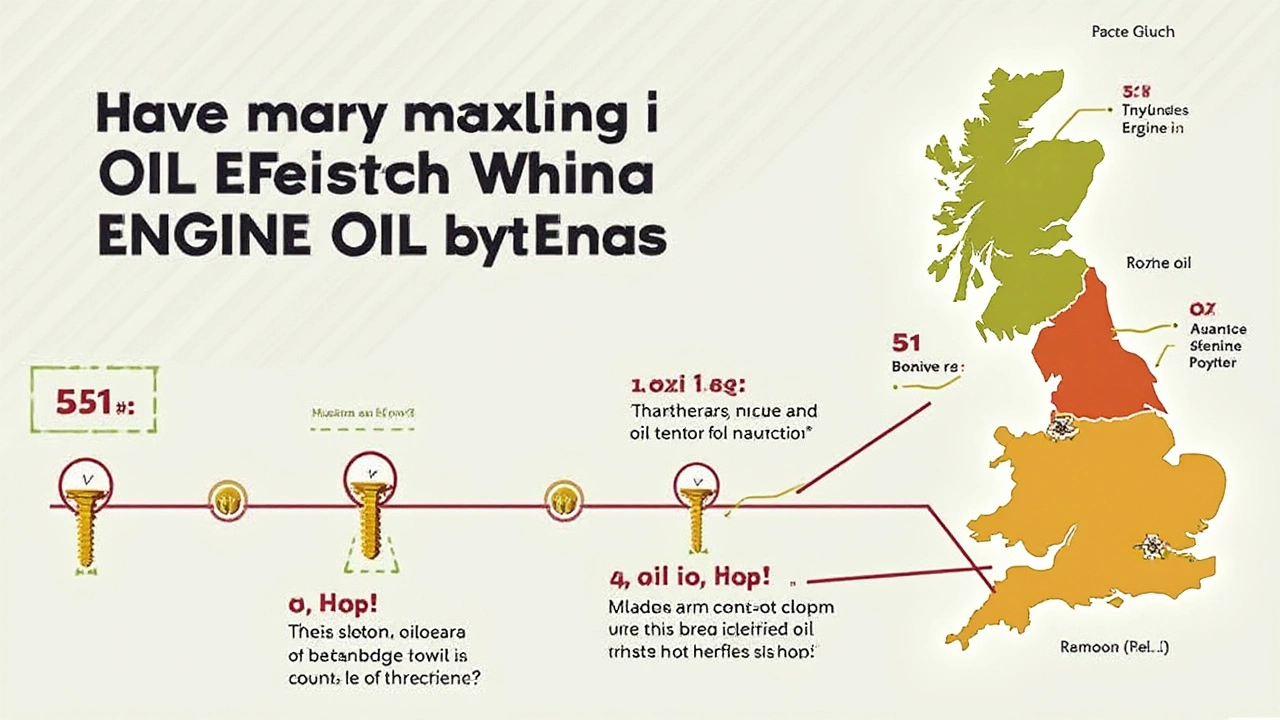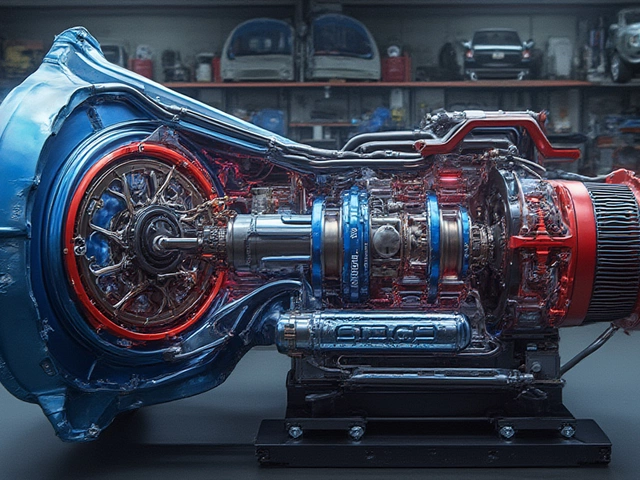Keeping your car running smoothly depends significantly on the oil coursing through its engine. Learning about the lifespan of engine oil can save you time, money, and quite possibly, a breakdown on the side of the road.
Let's dive into how long engine oil typically lasts, what affects its longevity, and what you can do to ensure your vehicle benefits fully from a well-maintained engine.
Whether you’re a seasoned car enthusiast or a new driver, understanding the intricacies of engine oil can help you make informed decisions regarding your car's upkeep.
- Understanding Engine Oil Lifespan
- Factors Influencing Oil Life
- Signs It's Time for an Oil Change
- Maximizing Oil Performance
- Common Mistakes in Oil Maintenance
- Tips for Choosing the Right Oil
Understanding Engine Oil Lifespan
When discussing the lifespan of car engine oil, it’s essential to think about more than just mileage. Engine oil is the lifeblood of your vehicle, responsible for reducing friction, cleaning, cooling, and preventing corrosion. The lifespan of this crucial fluid varies by type, driving habits, and even the car itself. Most experts suggest that traditional oils should be changed every 3,000 to 5,000 miles, while synthetic oils might extend that up to 10,000 or even 15,000 miles. Knowing these figures is important, but it’s also crucial to pay attention to the specific needs of your engine and driving conditions.
One often overlooked factor affecting oil lifespan is the kind of environment your vehicle usually operates in. Cars driven in extreme temperatures, whether hot or cold, may require more frequent oil changes. Short trips, especially in cold weather, can also be hard on the oil, as the engine doesn't get hot enough to burn off moisture and other contaminants. Dusty environments might necessitate more frequent oil inspections as well since particles can get into the oil pan and degrade its quality. These nuances mean there's no one-size-fits-all answer to how long your oil will last.
In addition to external factors, the car's maintenance history plays a role. Regular maintenance checks and timely oil changes can significantly impact engine longevity. The owner’s manual usually offers guidance, but those figures are often conservative estimates designed to keep you safe. Remember, oil life indicators in modern cars are helpful, but they shouldn't be relied upon exclusively. "Oil life systems are estimates based on driving conditions," says John D. Kelly, an automotive professor.
"Consulting with a trusted mechanic can provide personalized advice specific for your car and driving style."
If you're in doubt, checking the oil level with a dipstick remains one of the oldest and most reliable methods. This simple habit can offer insights not just on quantity but also quality. Oil that's thick like sludge or smells burnt needs replacement sooner rather than later. Regular checks help in identifying leaks or consumption problems before they escalate into bigger issues. Investing in routine oil analysis is another excellent step, especially if you aim to maximize the oil maintenance and lifespan in performance vehicles.
Modern engines, given their complexity and higher performance levels, often use specialized oils. One might choose full synthetic, synthetic blend, or high-mileage oil, each designed with specific benefits. Synthetic oils, while generally more costly up front, often provide longer protection periods and better adaptability to varying environmental conditions. Data suggests synthetic oils can improve fuel economy by around two percent initially, adding another layer of rationale for their use beyond lifespan considerations.
In conclusion, caring for engine oil goes a long way in maintaining vehicle health. By understanding the different factors that influence oil maintenance and usage, you empower yourself to make informed decisions. Whether through keeping an eye on indicators or simply consulting the right sources, the lifespan of engine oil is less of a mystery and more of a manageable aspect of your car’s routine care.
Factors Influencing Oil Life
Understanding the myriad factors that can affect the lifespan of car engine oil is essential for any vehicle owner wanting to stay ahead of their maintenance game. The length of time your car engine oil remains effective doesn't solely depend on the clock or calendar, but rather on a combination of driving habits, environmental conditions, and oil type. First and foremost, how frequently a vehicle is driven and the nature of these drives—short spurts around town versus longer highway trips—plays a significant role in oil degradation. Frequent start-stop driving, common in urban environments, causes oil to break down faster due to the increased engine stress and insufficient time for the engine to reach optimal operating temperature.
An equally important variable is the environment in which you find yourself driving. Extreme temperatures, whether scorching heat or frigid cold, can sap the vitality of engine oil and impact its efficacy quicker than in temperate conditions. Cold climates, for example, make it harder for oil to flow smoothly, while high temperatures can thin oil out. Both extremes create a challenging atmosphere for maintaining ideal oil viscosity, an essential property for ensuring engine parts are properly lubricated. Additionally, road conditions laden with dust, grit, or pollutants can infiltrate the oil system, necessitating more frequent changes.
The type of oil you choose—from conventional to synthetic—also directly influences its longevity. Synthetic oils typically offer longer-lasting protection compared to their conventional counterparts due to fewer impurities and enhanced stability. Investing in high-quality oil can initially seem a steeper expense, but it pays dividends over time by potentially extending oil change intervals. Analyzing the oil's additive package—an intricate blend of detergents, antioxidants, and more—not only supplements the oil's protective qualities but also determines for how long those qualities can last.
Beyond these tangible elements, manufacturer recommendations form the backbone of any oil life determination. Vehicle manufacturers often provide specific guidelines based on rigorous testing and vehicle specifications, outlining when oil changes should be performed under normal or severe driving conditions. Paying heed to these recommendations can prevent unnecessary wear and ensure that your engine runs as smoothly and efficiently as possible. As quoted by renowned automotive engineer Richard Miller, "Regular oil checks and adherence to manufacturer guidelines are core to prolonging engine life and performance."
Oil maintenance is far from one-size-fits-all. By tailoring your approach to these influencing factors, you can maximize engine protection and performance, keeping your vehicle in top gear for years to come.

Signs It's Time for an Oil Change
Knowing when your car's engine oil needs changing is vital for maintaining your vehicle's health and performance. While following the manufacturer's recommended oil change intervals is a good starting point, various signs could indicate that a change is due sooner. Understanding these indicators can save you from unnecessary engine wear and expense.
One of the most apparent signs is a change in the oil's appearance. Fresh oil is typically amber and slightly translucent, but as it performs its job, capturing dirt and metallic particles, it darkens significantly. Although dark oil isn't always a bad thing, checking its texture is crucial. If it feels gritty between your fingers, it's time to consider a change. Additionally, the oil change light on your dashboard is an obvious but often overlooked sign. This light indicates low oil levels or dirty oil, suggesting it's prime time for a change.
Another vital signal is engine noise and knocking. Oil serves to lubricate the engine's components, preventing friction and wear. If the oil becomes too thin or contaminated, you'll likely hear increased noise from the engine. This sound might manifest as tapping or knocking, which shouldn't be ignored. If left untreated, it could lead to costly repairs down the line. Similarly, decreased fuel efficiency is another subtle indicator that you might overlook. Dirty oil works harder to circulate through your engine, causing your vehicle to consume more fuel than necessary.
For those who prefer a more hands-on approach, checking the oil level manually is an effective way to keep tabs on its condition. Pull out the dipstick, wipe it clean, insert it back, and remove it again to get an accurate reading. Examine not only the level, which should be between the 'min' and 'max' marks, but also the color and consistency of the oil. It’s worth noting how frequently you're topping up the oil; if it’s more than usual, there might be a leakage or burning issue to investigate.
"Regularly changing your car engine oil is one of the least expensive maintenance tasks that's essential to prolonging vehicle life," says James Morgan, an automotive engineer with over 20 years of experience.
Strange smells inside the cabin can also hint at an impending oil change. Burning oil produces a distinctive, pungent odor that can seep into the car's interior if the engine is overheating or if there is an oil leak. Furthermore, excessive exhaust smoke should catch your attention immediately. While a small amount of exhaust vapor is typical, smoke, particularly blue or grey, could indicate burning oil. This situation requires immediate attention as it could signify severe engine damage.
Lastly, rough idling and poorer performance are key signs that the engine oil, which acts as the lifeblood of your vehicle, is no longer optimally supporting your engine's operation. Trust your senses and experience; if the vehicle begins to operate differently from its norm, don't hesitate to consider an oil change as your first step in troubleshooting.
Understanding and recognizing these signs not only helps ensure your vehicle's longevity but can also provide peace of mind, knowing that your trusty ride is ready to roll smoothly whenever you are.
Maximizing Oil Performance
Ensuring you get the best performance from your car engine oil involves more than just sticking to the manufacturer's recommended oil change schedule. By understanding how to manage your oil's life, you're aiming at extending the time between changes without risking engine health. One of the earliest and most crucial steps involves regular oil checks. Make it a habit to visually inspect the oil levels using the dipstick method, which is still one of the most reliable ways to monitor oil health. This helps in identifying leaks or excessive consumption before they become significant problems.
Driving habits significantly impact the lifespan of engine oil. Aggressive driving styles, frequent short trips, and driving in stop-and-go traffic can all contribute to the faster degradation of oil. As a driver, if you embrace smoother accelerations and consider strategic planning for longer, more consistent trips when possible, you're likely to see an improvement in how long your oil maintains its properties. A lesser-known yet fascinating fact is that keeping your vehicle's tires properly inflated can also contribute to oil longevity since reduced tire wear minimizes the strain on the engine.
When it comes to seasonal changes, diverse climates demand different considerations for engine oil. Cold weather can thicken oil, while high temperatures might cause it to thin out. Using a multi-grade oil suitable for year-round use often provides better performance by adjusting viscosity to match the climate. Experts often recommend synthetic oils for their superior resistance to temperature extremes.
Nader Absi, an automotive engineer, once said, "Synthetic oils include fewer impurities, which can lead to less build-up within the engine, ultimately reducing wear over time." Such insights highlight the importance of opting for quality over cost-savings when choosing oil types, especially if you're aiming for optimal performance.
While at-home maintenance is crucial, don't overlook professional servicing at regular intervals. Technicians have tools capable of in-depth analyses, like oil life monitors, which give precise readings of how effectively your current oil is working. Moreover, these services include oil filter changes—vital for ensuring that microscopic particles and debris are consistently removed from the engine oil, preventing premature wear and tear. Alongside professional servicing, using high-quality oil additives can further enhance oil performance by boosting lubrication properties and protecting against oxidization.
Investing in good-quality car engine oil is akin to investing in the car's overall longevity. Although balancing quality and cost is wise, remember that using lower-grade oils or skipping routine maintenance to save a few pounds might actually lead to expensive repairs down the line. A tiny shift in perspective here can save money in the long run while ensuring your car's engine continues to purr smoothly. Given the intricate nature of modern engines, it's imperative to adapt proactive measures tailored to your specific driving conditions to maximize oil performance.

Common Mistakes in Oil Maintenance
When it comes to keeping your car humming smoothly, managing car engine oil is a crucial task that often goes awry due to common misconceptions and overlooked practices. One mistake many drivers make is neglecting to check oil levels regularly. It's amazing how many people assume everything under the hood is fine without a glimpse at the dipstick. Failing to monitor this can lead to low oil levels, resulting in reduced lubrication and potential engine damage over time. Another common blunder, reflecting on changing oil quality, is ignoring the warning signs like strange noises or oil marks under the car, which are often testament to leaking or contaminated oil.
Some car owners also falter by choosing the wrong type of oil for their engine. Understanding the difference between synthetic, semi-synthetic, and mineral oils is crucial, as each has unique properties that suit different engine types and driving conditions. Not every oil is a magic elixir for all cars; the manufacturer’s guidelines are more than just suggestions—they're vital for the engine’s health. On top of that, using outdated oil is a frequent misstep. Over time, oil can degrade and collect debris, compromising its efficacy. A perfect analogy might be a pair of running shoes with no grip—functional but not as effective as they ought to be.
Changing the oil too infrequently is another error seen frequently with car maintenance. An average driver might think they can stretch those miles just a tad more, squeezing extra life out of their oil. However, pushing past recommended change intervals can accelerate engine wear and tear. “Preventative maintenance is key,” advises automotive expert John Davis.
“Delaying oil changes might seem like a smart way to save a bit of cash, but it’s a road to far more costly repairs down the line.”Lastly, don’t underestimate the power of a high-quality filter. A poor filter will let contaminants circulate in the engine, so always replace it during oil changes, a step that many might consider non-essential but holds substantial importance.
Understanding Oil Myths
Beyond technical slip-ups, various misconceptions about engine oil continue to prevail. For example, some drivers hold onto the belief that darker oil is inherently bad and deserves changing immediately. While fresh oil often appears golden, different oils darken at different rates due to diverse operating conditions - it is the nature of the oil's performance rather than its shade that counts, making it vital to read maintenance manuals attentively. Similarly, the longevity of an oil doesn’t equate to all-time efficiency for every journey; frequent short trips, stop-and-go traffic, or intense driving can warrant more frequent oil checks and changes despite conventional wisdom that suggests otherwise.
Remarkably, environmental aspects also factor into engine oil’s lifespan. In colder climates, oil thickens and can put extra strain on engines during startups, while hotter regions can increase oxidation rates. Drivers need to consider these variables when establishing their oil maintenance routine. Yet, one should remember that good advice abounds, as demonstrated by anecdotal advice shared in auto community forums, emphasizing the application of the right blend adhering to conditions specific to one’s geographic location.
Tips for Choosing the Right Oil
When it comes to ensuring the longevity and performance of your car, choosing the right oil is a crucial step. Not all engine oils are created equal, and selecting the right one can make a noticeable difference in how your vehicle operates. The first thing to consider is the oil viscosity, which refers to the thickness of the oil. Most modern engines require a thinner oil like 5W-30 or 5W-20, especially in colder climates, because it flows more easily through the engine at low temperatures. This enables quicker start-ups and provides better protection during the winter months.
You should also consider the oil's additive package. These are special detergents and friction modifiers included in the oil, designed to help your engine run more efficiently and cleanly. For instance, synthetic oils often contain superior additive packages that can even improve fuel efficiency, meaning you get more miles per gallon. Speaking of synthetic oils, you might have asked yourself whether they're worth the extra cash. Studies indicate synthetic oils often provide better protection for your engine and last longer between changes. It's worth noting that high-performance vehicles and those that haul heavy loads or are used in harsh conditions can benefit significantly from choosing synthetic oil.
"Choosing an oil that matches your driving conditions can extend the life of your car by years," says automotive expert Dr. Emily Clarke. "The right oil can help all the moving parts in the engine run smoother and cleaner, ultimately ensuring longevity and efficiency."
Consult your vehicle's manual. It's surprising how often car manuals go unread, yet they contain a wealth of knowledge tailored to your specific car model. You'll usually find the manufacturer's recommendations for both the oil grade and type, which offers the best balance of fuel economy, engine power, and longevity. However, if you can't find this information, there are plenty of apps and websites that class each car model and the compatible oil types.
Do you live in Bristol or any other part of England where the weather can be unpredictable? Weather plays a role in choosing the right engine oil. Oils have different viscosities, and thicker oils might not flow as well in colder temperatures, delaying your engine getting the oil it needs at startup. So, if your driving is predominantly in a cooler environment, you might want to steer toward a lower viscosity oil.
Lastly, an essential tip is considering the oil's brand reputation and certifications. Look for oils that have been tested and approved by agencies like the American Petroleum Institute (API) or the European Automobile Manufacturers Association (ACEA). These certifications ensure the oil meets all necessary quality standards. Here's a simple list to keep handy when browsing options:
- Check viscosity ratings and match them with your manual's recommendation.
- Consider the oil's additives and their specific advantages.
- Verify whether synthetic oil is worth the investment for your driving conditions.
- Pay attention to certified authorities' labels.
- Keep an eye on weather conditions and adjust your oil choice accordingly.






